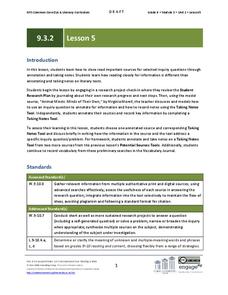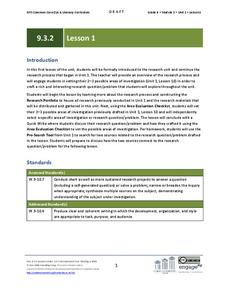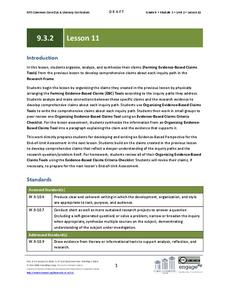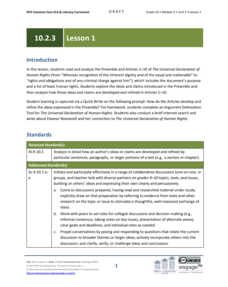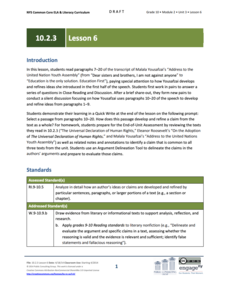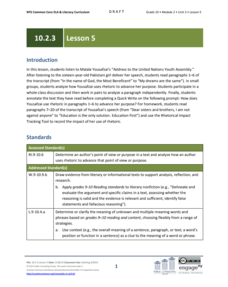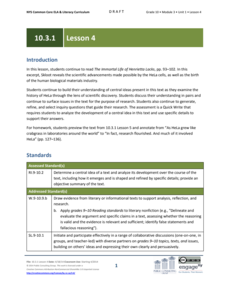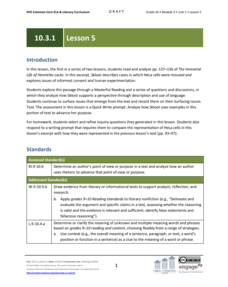EngageNY
Grade 9 ELA Module 3, Unit 2, Lesson 5
Once you find and evaluate your sources, it's time to discern the most helpful information. In a research lesson plan based on questions derived from Temple Grandin's Animals in Translation, practice annotation and taking notes.
EngageNY
Grade 9 ELA Module 3, Unit 2, Lesson 6
Having formulated a list of inquiry questions based on a reading of Temple Grandin's Animals in Translation, high schoolers complete a frame tool for their research. They categorize their questions based on preliminary research and trace...
EngageNY
Grade 9 ELA Module 3, Unit 2, Lesson 1
High schoolers apply sophisticated research skills to an inquiry-based project connected to Temple Grandin's Animals in Translation. Working from the prior unit and the model areas of investigation, including animal intelligence,...
EngageNY
Grade 9 ELA Module 3, Unit 2, Lesson 4
It seems like the first result in a search engine is the best source, but how can you be sure? An activity on assessing sources guides ninth graders through an integral part of their inquiry-based research project, based on questions...
EngageNY
Grade 9 ELA Module 3, Unit 2, Lesson 8
Learning about research can be as important as learning about the topic itself. As ninth graders continue their guided research projects from Temple Grandin's Animals in Translation, they discuss their possible inquiry paths with group...
EngageNY
Grade 9 ELA Module 3, Unit 2, Lesson 10
Ninth graders continue their inquiry-based research projects focused on the topics in Temple Grandin's Animals in Translation. After formulating, honing, and adapting their research frames in the previous lessons, learners select...
EngageNY
Grade 9 ELA Module 3, Unit 2, Lesson 9
Part of being a strong researcher is knowing if you're headed in the right direction. Class members study their research frames formulated in the previous lessons of the unit and decide what parts of their inquiry paths need revision or...
EngageNY
Grade 9 ELA Module 3, Unit 2, Lesson 11
Asking questions often leads to more questions. In a research instructional activity based on Temple Grandin's Animals in Translation, ninth graders formulate claims based on the synthesis and analysis of each of their inquiry paths. A...
EngageNY
Grade 9 ELA Module 3, Unit 2, Lesson 12
Ninth graders synthesize their inquiry paths, research process, and claim formulation with a writing assessment at the end of the unit. Learners write a one-page perspective about their conclusions from the research process and outcomes...
EngageNY
Grade 10 ELA Module 2: Unit 3, Lesson 3
What is in a word? Scholars look closely at the words from a speech by Eleanor Roosevelt. They analyze how she supports a claim without debate and without rejecting others. Learners use jigsaw discussion, guided questions, and respond to...
EngageNY
Grade 10 ELA Module 2: Unit 3, Lesson 1
Scholars examine the Universal Declaration of Human Rights and analyze the ideas in the preamble. Readers define new vocabulary words, listen to a Masterful Reading, answer questions in pairs, participate in a jigsaw discussion, and...
EngageNY
Grade 10 ELA Module 2: Unit 3, Lesson 2
Is good good enough? Scholars examine claims made in a speech by Elanor Roosevelt. Roosevelt claims that people should adopt the Universal Declaration of Human Rights because it is a good document. Readers discuss their ideas in pairs,...
EngageNY
Grade 10 ELA Module 2: Unit 3, Lesson 6
Let children be children. Scholars read in a speech by Malala Yousafzai how childhood is absent as children are forced to work and get married at a young age. Learners analyze part of the speech and discuss it in groups. After sharing...
EngageNY
Grade 10 ELA Module 2: Unit 3, Lesson 5
A person doesn't have to be an adult to make a difference! Scholars examine a speech by a 16-year-old girl. They discuss her word use, answer guided questions, and complete a rhetorical tracking tool. Readers end their analyses by...
EngageNY
Grade 10 ELA Module 2: Unit 3, Lesson 7
It's time to show what you know. The final lesson asks scholars to reflect on the seven-lesson plan unit and complete an end-of-unit task. Readers consider the claims presented in speeches by Eleanor Roosevelt and Malala Yousafzai before...
EngageNY
Grade 10 ELA Module 3: Unit 1, Lesson 2
Is writing a craft? Scholars work in pairs and groups to uncover the author's craft presented in The Immortal Life of Henrietta Lacks. They answer guided questions, discuss with peers, and analyze the series of events. Completing a...
EngageNY
Grade 10 ELA Module 3: Unit 1, Lesson 1
Can people live forever? Scholars ponder the answer as they analyze an excerpt from The Immortal Life of Henrietta Lacks. As readers discover Lacks' immortal cells, they discuss how the author carefully sequences, connects and unfolds...
EngageNY
Grade 10 ELA Module 3: Unit 1, Lesson 4
It's all about the details. Scholars examine how specific details contribute to a central idea in an excerpt from The Immortal Life of Henrietta Lacks. Learners discuss the details in pairs, share with the group, and respond to guided...
EngageNY
Grade 10 ELA Module 3: Unit 1, Lesson 5
Science over humanity? Scholars analyze an excerpt from The Immortal Life of Henrietta Lacks. They must consider if the experimentation of Henrietta's cells without her consent was worth the information gained about cancer. They discuss...
EngageNY
Grade 10 ELA Module 3: Unit 1, Lesson 7
How did it happen? Scholars examine how the author describes the order of events in an excerpt from The Immortal Life of Henrietta Lacks. Learners use a Surfacing Issues Tool to guide their thoughts. Finally, they share ideas in pairs...
EngageNY
Grade 10 ELA Module 3: Unit 1, Lesson 8
Sometimes, you just need to get to the point. Scholars examine an excerpt from The Immortal Life of Henrietta Lacks, analyzing it and gathering details to determine the central idea. Completing the Surfacing Issues Tool organizer and...
EngageNY
Grade 10 ELA Module 3: Unit 1, Lesson 10
I know exactly how you feel. That may be a statement between Henrietta Lacks and John Moore. Scholars read John Moore's story and compare his story of cell use to that of Henrietta. Learners record in a vocabulary journal, analyze...
EngageNY
Grade 10 ELA Module 3: Unit 1, Lesson 11
Have you had a change of heart? Scholars consider whether their views change after gaining new information about tissue ownership. They read John Moore's court hearings and respond to a quick write prompt, noting if the new information...
EngageNY
Grade 10 ELA Module 3: Unit 1, Lesson 13
Don't argue for the sake of argument. Scholars begin their work in lesson plan 13 and continue into lesson plan 14 as they analyze The Immortal Life of Henrietta Lacks. Working in groups, learners work toward collecting text evidence and...


